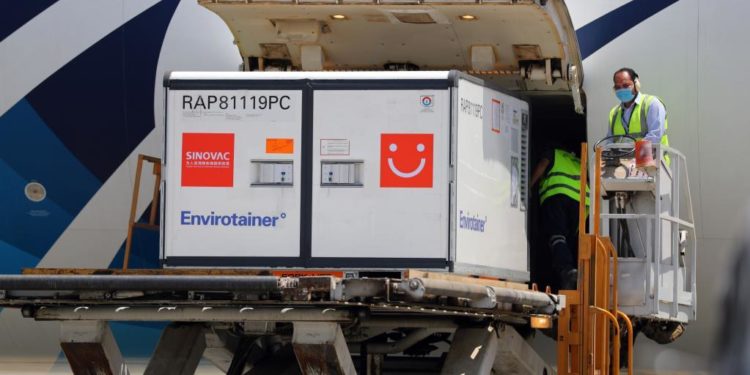Africa is set to receive 32.5 million COVID-19 vaccine doses from China’s Sinopharm and Sinovac through the COVAX facility, with tens of millions more to come, the World Health Organization said on Thursday.
“These doses have been allocated to countries this week and will be delivered as soon as countries are ready to receive them,” said Matshidiso Moeti, the World Health Organization regional director for Africa, at a news conference on Thursday.
The vaccines are part of the 110 million doses the two companies will supply to COVAX for immediate supply to low-income countries, in a deal signed on July 12 with options for additional doses.
According to the Sinopharm advance purchase agreement, Gavi, the vaccine alliance, committed to purchase 60 million doses on behalf of COVAX, to be made available from July through October.
The deal also gave Gavi the option to purchase a further 60 million doses from October to December, and 50 million more doses in the first half of next year.
As per the Sinovac advance purchase agreement, Gavi committed to purchase 50 million doses on behalf of COVAX, to be made available from July through September.
In addition, Gavi has the option to purchase a further 150 million doses from October to December, and 180 million more doses in the first half of next year.
The potential doses of both Sinopharm and Sinovac vaccines could be available to both self-financing participants of the facility, as well as those supported by the Gavi COVAX advance market commitment.
Already several African countries have administered Sinopharm and Sinovac vaccines acquired through bilateral agreements.
According to Bridge, a Beijing based independent consultancy that tracks China’s impact on global health, China has delivered 41.6 million doses to 36 African countries so far, of which 7 million are donations.
China has also signed agreements with Egypt, Morocco and Algeria to locally manufacture Sinovac and Sinopharm vaccines. Already, Egypt has manufactured 1 million doses.
Moeti said COVAX is confident it will meet its goal to deliver at least 520 million doses to Africa by end of this year, based on the expectation of more vaccine candidates and manufacturing sites at the tail end of the review process for approval by WHO for emergency use listing.
The African Union’s Africa Vaccine Acquisition Trust is also expected to supply 45 million doses to the continent by December.
Moeti said COVAX and the World Bank are set to further boost COVID-19 vaccine supply for developing countries through a new cost-sharing arrangement.
The arrangement allows low-income countries to purchase doses beyond the fully donor-subsidized doses they are already receiving from COVAX.
“With the expected influx of vaccines, it is crucial countries scale up all aspects of vaccine rollout to reach as many people as possible,” Moeti said. “This entails mobilizing adequate resources, including finances for vaccination activities, logistics and personnel, as well as addressing any concerns by communities — including those fueled by misinformation — to increase vaccine confidence and demand.”
Moeti said Africa needs up to 820 million doses to fully vaccinate 30 percent of its population by the end of this year, considering a two-dose schedule.
John Nkengasong, the director of the Africa Centers for Disease Control and Prevention, said Africa may need more doses that initially estimated to achieve the 60 percent vaccination target by the end of next year.
This is due to the highly transmissible Delta variant and the current COVID-19 infections in young people.
Nkengasong urged Africans, including those fully vaccinated, to continue observing public health measures of social distancing, wearing face masks and washing hands.
“While vaccines are coming, it will take time to reach the critical level where we can relax and feel more comfortable. There is a lot we don’t know about this virus,” Nkengasong said.
“Today we are taking about Delta variant, we don’t know what other variants will emerge tomorrow, so we just need to continue implementing public health measures to control the spread of the virus, relieve health systems and vaccinate at speed and scale.”
Mutahi Kagwe, Kenya’s cabinet secretary for health, urged Kenyans on Thursday to wear face masks in public places, warning cases of the Delta variant, first identified in India, have been reported in fully vaccinated people.









